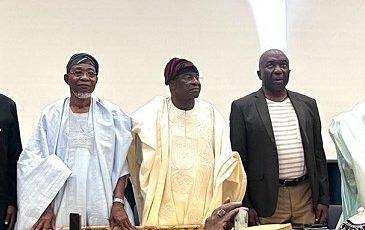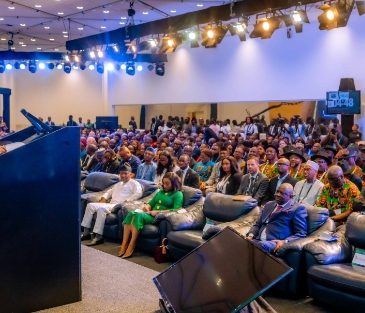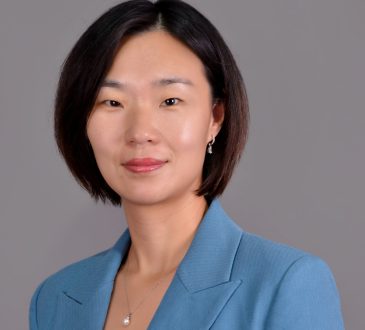
I am delighted to welcome you to this special session of the National Economic Council, focusing on Security. As you’re all aware, the Buhari administration came into office on a vision that covered three key areas: Security, the Economy and the fight against Corruption.
All three issues are closely linked, of course. Without guaranteeing security, we will struggle to attract the kind of investments, domestic or foreign, needed to create jobs and prosperity for our people. And when those jobs are hard to find and keep, our people will naturally be more susceptible to the lure of criminal activity. Which means that governments that are serious about fighting crime ought to be extremely serious about fighting poverty.
And I take the point that the Chairman of the Governors’ forum made about investments in agriculture, although the N23 billion investment is one aspect of agriculture which is the Anchor Borrower’s Programme. Our total investment is well over five times that. If you look at all the other areas in which we are investing in agriculture, and that excludes what the States are also investing in agriculture. So I think that substantial effort is being made, still not enough but certainly more than N23 billion.
Corruption and Security are also interconnected. We are all witnesses to how, only a few years ago, much of North Eastern Nigeria was at risk to falling completely into the hands of Boko Haram, largely because widespread corruption in the military had robbed our troops of the resources and morale needed to fight and defeat the terrorists.
Regarding this all-important issue of security in Nigeria, we all know what the issues are. In our lives as politicians and as elites; in our security meetings and confidential briefings, in news reports and editorials in the media, we are all daily confronted by the disturbing reality of Nigeria’s security situation.
Now I think is the time to implement our thinking and our talking; to add action to our analysis. And this action must be bold, ambitious, urgent – and, and very importantly – innovative. It was Albert Einstein who said, and I quote, that “We cannot solve our problems with the same level of thinking that created the problems in the first place.”
This is a challenge to all of us, to confront these matters with utmost seriousness. Because the problems we face as a nation are not static, but instead continue to evolve, our thinking and our solutions for them must also be equally dynamic, to take into account the peculiar realities of the 21st century. I have spoken at a number of recent fora about how technology and the internet have altered the nature of conflict and war in contemporary times, enabling and amplifying the efforts and impact of terrorists, insurgents, warmongers, secessionists, and peddlers of hate speech.
Against this backdrop, the question we should be asking ourselves, as Governments, especially as Chief Security Officers in our States, as Law Enforcement Agents, is: how can we take advantage of these same tools and technology to stay permanently ahead of those who seek to wield them to create mischief, and cause terror, fear and bloodshed?
These are the conversations that we should be having, and at the highest levels of government no less. My expectation is that we will, at this forum, focus on solutions, instead of rehashing the problems.
But let me just reiterate an important fact, one of the reasons why the National Economic Council is so important is because the framers of our Constitution recognise that that the Federal Government alone cannot solve Nigeria’s security or economic challenges. Security is a collective enterprise, requiring the harmonization of efforts from all three tiers and branches of Government, and from the private sector, civil society and indeed the general public as well.
Yesterday, we took an important step in incorporating all of our society into this security issue and into the fight against insecurity in our country. Pursuant to our Constitution, I issued a directive to the Inspector General of Police to constitute the Community Policing Programme. As you know the Community Policing Programme is one that the Police itself had developed over the years.
But by this directive, we expect that the community Policing Programme will take root and take effect and all of our Police formations across the country will engage their communities in the very creative ways the Police themselves have prescribed in the Community Policing programme.
We expect that this will be a fundamental change in the way that policing is carried out in our country and that it will yield the kinds of results that we expect.
The Buhari administration has already set a pattern of engagement and collaboration with Governors, and we are committed to maintaining this atmosphere of frank engagement.
You are aware that this was not always the case; and prior to this administration, the National Economic Council had not exactly fulfilled its obligations as an economic council because of the unending series of conflicts between the Federal and State Governments over very many issues.
But we are determined to do things the right way, to be transparent in our dealings with you, to respect your views, regardless of partisan or ideological affiliations, and to join hands with you to create positive change in the lives of all our people.
Please permit me a comment on hate speech. The Federal Government has today drawn the line on hate speech. Hate speech is a specie of terrorism. Terrorism as it is defined popularly is the unlawful use of violence or intimidation against individuals or groups especially for political ends. The law, that is the Terrorism (Prevention) Act 2011 (as amended), defines terrorism as inter Alia, an act which deliberately done with malice which may seriously harm or damage a country or seriously intimidate a population.
The intimidation of a population by words, by speech is an act of terrorism and this government intends to take this matter very seriously. As I have said, we’ve drawn a line against hate speech, it will not be tolerated, it will be taken as an act of terrorism and all of the consequences will follow it.
I call on all business, religious and political leaders, whatever your political leaning, your religion or tribe or faith to condemn in the strongest possible terms at all times, hate speech.
Speech that promotes violence against an individual or group, especially when such comes from people of your own faith, tribe or group, your silence in such situations can only be seen as an endorsement.
Hate speech, and the promotion of the same throughout history from Nazi Germany and the extermination of Jews to the Rwandan genocide succeeded in achieving their barbarous ends by the silence of influential, voices from the aggressor communities.
When leaders in communities that speak in such a manner as to create dissension or to intimidate a population are quiet, they do a great disservice to our unity and nation.
This is why I urge all of our political leaders, religious leaders, business leaders and all of those who truly want a united country and a country where there will be peace and security, to ensure that we do not tolerate by our silence the hate speech that we hear every day in our community.
In closing, let me remind you that our Constitution states that the primary purpose of government shall be the security and welfare of the people. And as President Buhari likes to say: “you cannot administer a country you have not secured.”
We will not relent in our vision to ensure a secure country, in which all citizens can confidently aspire to achieve their dreams and ambitions. I am confident that today will mark an important milestone in the achieving that vision.
I thank you very much for listening.






